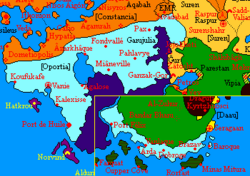Oportia: Difference between revisions
No edit summary |
Tag: Manual revert |
||
| Line 72: | Line 72: | ||
===Law enforcement and military=== | ===Law enforcement and military=== | ||
Unlike other countries, the law enforcement and territorial defense of Oportia is the responsibility of a single centralized government body, the [[Oportian Security Forces|Security Forces]], which is divided into three branches: | Unlike other countries, the law enforcement and territorial defense of Oportia is the responsibility of a single centralized government body, the [[Oportian Security Forces|Security Forces]], which is divided into three branches: Land Forces, Air Force and Navy. | ||
===Economy=== | ===Economy=== | ||
Oportia is a [[wikipedia:Market economy|market economy]]. Since Oportia is a state with no taxes and only basic regulations, businesses and workers enjoy wide economic freedom and prosperity in all economic sectors. Workers' rights are protected by Constitution. The private sector is dominating in all economic spheres. Public sector has a notable presence in the country's economy, and its purpose is creating profit for the funding of the state activities. The extraction and production of raw materials is the most important sector of the Oportian economy, with manufacturing and service sectors growing since the country's independence. | Oportia is a [[wikipedia:Market economy|market economy]]. Since Oportia is a state with no taxes and only basic regulations, businesses and workers enjoy wide economic freedom and prosperity in all economic sectors. Workers' rights are protected by Constitution. The private sector is dominating in all economic spheres. Public sector has a notable presence in the country's economy, and its purpose is creating profit for the funding of the state activities. The extraction and production of raw materials is the most important sector of the Oportian economy, with manufacturing and service sectors growing since the country's independence. | ||
Revision as of 18:06, 26 June 2022
| The State of Oportia L'État d'Oportie | |||
| |||
| Motto: Liberté avant tout | |||
| Anthem: Le bateau | |||

| |||
| Map versions | 17.5.7 – | ||
| Capital | Vanie | ||
| Official language(s) | Alexandrian Istvanistani | ||
| Official religion(s) | None | ||
| Demonym | Oportian | ||
| - Adjective | Oportian | ||
| Government | Constitutional federal union of city-states under semi-direct democracy | ||
| - Federal Representative | Jean Nouel | ||
| - Legislature | Federal Electorate | ||
| Establishment | 1706 AN | ||
| Area | 149,112 km2 | ||
| Population | 2,675,000 (1706 est.) | ||
| Currency | Mérite | ||
| Calendar | Norton Calendar | ||
| Time zone(s) | CMT+2 | ||
| Mains electricity | 230 V, 50 Hz | ||
| Driving side | Right | ||
| Track gauge | Standard (1,435 mm) | ||
| National website | gou.op | ||
| National forum | |||
| National animal | |||
| National food | |||
| National drink | |||
| National tree | |||
| Abbreviation | OPO, OP | ||
The State of Oportia (Alexandrian: L'État d'Oportie) is a country located in the southwest of continent of Eura.
In 1707 AN, the country was ranked first in Micras Democracy Index, with maximum score in political participation and civil liberties.
Etymology
Oportia's name comes from Alexandrian words "eau" (pronounced o, meaning water) and "port".
Government
Executive
The Head of State and Government is the Federal Representative, who presides over the Federal Cabinet and all its ministries.
Legislature
The Federal Electorate is the legislative body of Oportia and is comprised of the national electorate, which proposes and votes on laws, public initiatives and referendums, and the Federal Representative, whose task is approving or rejecting the passed motions.
Judiciary
The Federal Court is the supreme court in Oportia, and has jurisdiction over violations of constitution and constitutional rights, federal law, inter-administrative laws and international laws the nation has been obliged to abide.
Politics
Constitution
Oportian Constitution defines basic and political rights of individuals, as well as dividing power, jurisdiction and authority between the federal and city level.
Some of the most important laws in the Constitution are:
- Political and military neutrality of the state
- Prohibition of taxes
- Freedom of navigation of all ships, regardless of their origin
- Freedom of import and export of goods, regardless of their origin
- Prohibition of death penalty
- Gun ownership rights
- Tendency towards environmentalism
Law enforcement and military
Unlike other countries, the law enforcement and territorial defense of Oportia is the responsibility of a single centralized government body, the Security Forces, which is divided into three branches: Land Forces, Air Force and Navy.
Economy
Oportia is a market economy. Since Oportia is a state with no taxes and only basic regulations, businesses and workers enjoy wide economic freedom and prosperity in all economic sectors. Workers' rights are protected by Constitution. The private sector is dominating in all economic spheres. Public sector has a notable presence in the country's economy, and its purpose is creating profit for the funding of the state activities. The extraction and production of raw materials is the most important sector of the Oportian economy, with manufacturing and service sectors growing since the country's independence.

